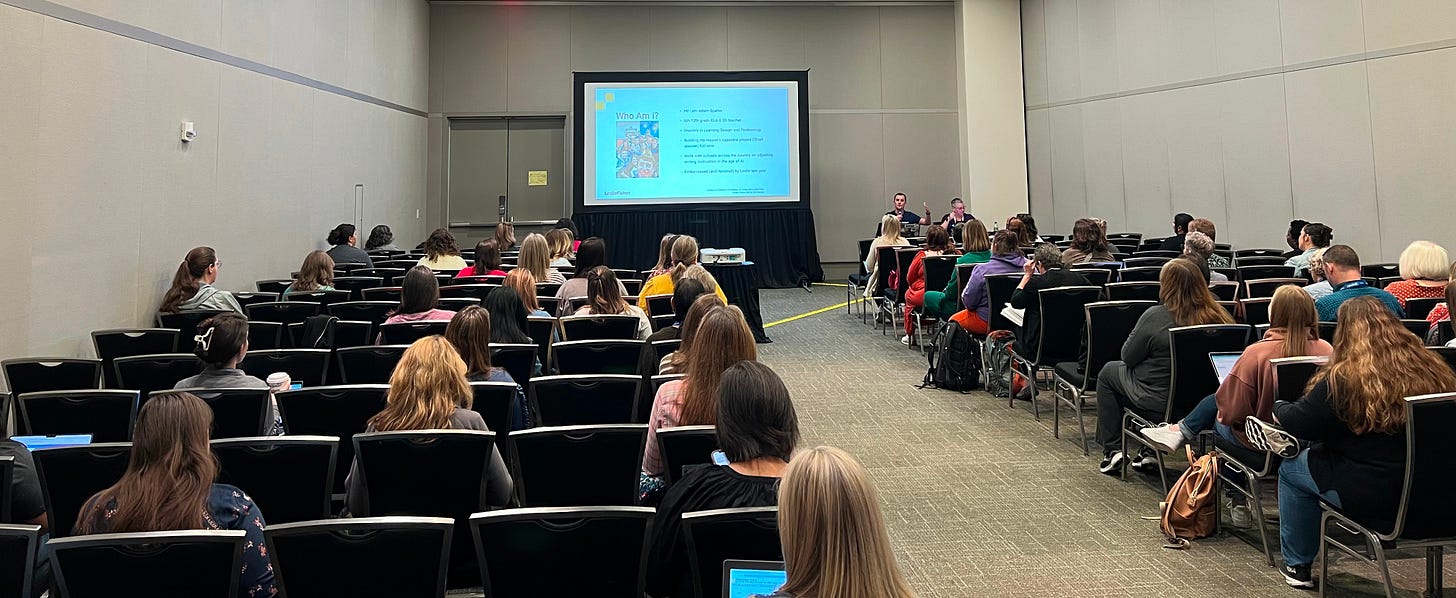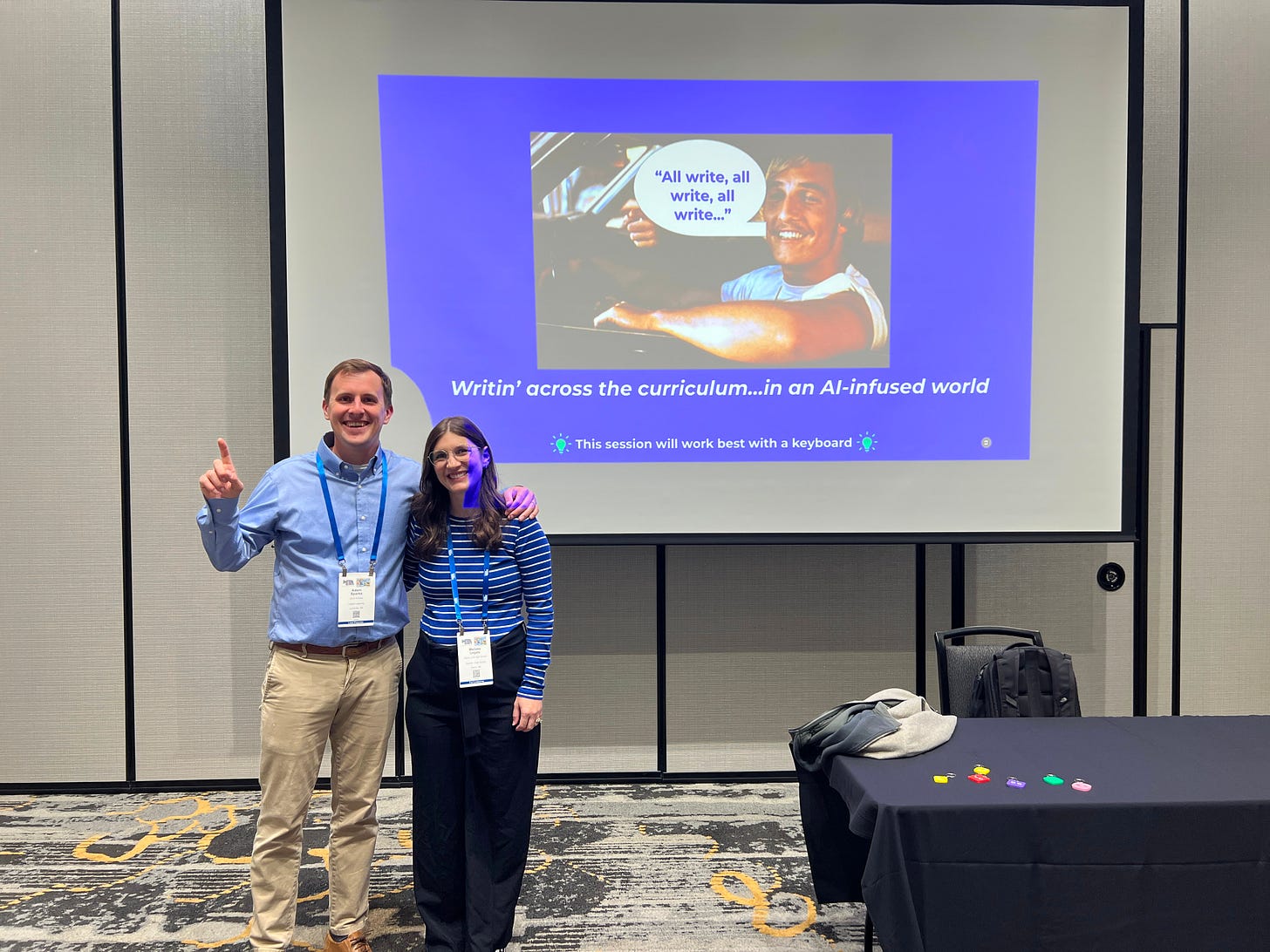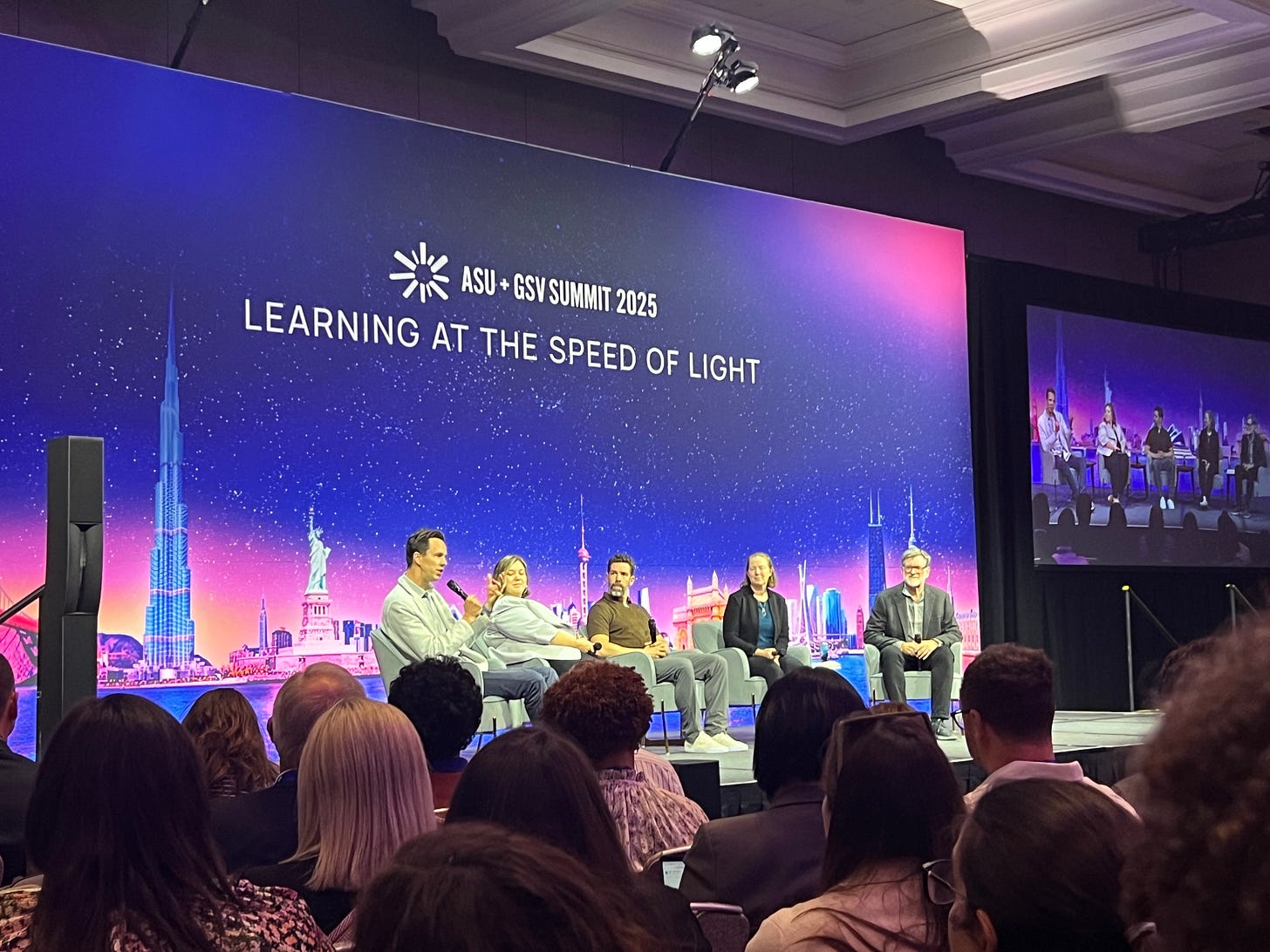Edtech needs more dialectical thinking
As the anti-edtech movement grows, our community needs to start deliberately engaging with ideas and beliefs that are contrary to our own.
It’s here. ISTE. The world’s largest edtech conference. I’ve never been and couldn’t be more excited to be heading down to San Antonio to share our work and celebrate with fellow educators who share the belief that technology can help improve learning outcomes for students.
I think we should also be aware that not everyone is celebrating. An anti-edtech movement is growing. We should consider this at ISTE this week.
This has been on my mind at every conference we’ve attended this year: Edtech needs more dialectical thinking.
To explain what I mean, I need to go back to a much smaller conference earlier this year that first got me thinking about this: ResearchED.

ResearchED Delaware
The most memorable conference we presented at this year was ResearchED, Delaware. ResearchED has shaped how I understand cognition and learning. Dylan Wiliam, an important voice in the community, is an advisor of ours at Short Answer. I’ve long looked to their work for guidance, so I was excited to share ours.
I was caught off guard, then, to arrive and find out that our work is, in fact, evil.
Turns out digital technology in the K12 classroom is a big no-no for ResearchED. This was expressed in different ways, but most clearly in the closing keynote, which was recorded and shared as a podcast.
In the keynoters’ view, edtech is a distraction. It prioritizes engagement over best practices in teaching and learning. In doing so, it too often violates tenets of cognitive load theory, especially the split attention effect. Most dubiously, “research shows that it doesn’t improve learning outcomes.” The primary research used to support that statement seemed to be a 2015 OECD report
Because of their talk, I read that OECD report. I also read John Hattie’s meta-analysis on edtech in Visible Learning. I re-listened to their podcast to better understand their arguments. I reflected. I wrote a blog post (that I came to feel was unproductively inflammatory, like their keynote, so I never posted it).
Here’s what I learned:
The 2015 OECD report does not support their claims. Where it does show “no appreciable improvements in student achievement in reading, mathematics, or science in the countries that had invested heavily” in edtech, it doesn’t argue against the use of edtech. It generally argues that edtech isn’t bad, our implementation of it is. We need to use technology more strategically to support good pedagogy and invest in better training.
Now, my point here is not actually to debate whether or not research was misrepresented. My point, oddly enough, is to celebrate how much I learned. ResearchED changed some of my beliefs, especially around the value and meaning of “engagement” in K12 classrooms (more in future post). And in that way, it deepened my understanding of edtech in ways that few edtech conferences have.
It pushed me to engage with an opposing viewpoint…which made me realize how little this happens in edtech. I think that needs to change.

Dialectical thinking and its absence
Dialectical thinking means deliberately seeking out ideas that are contrary to the ones you hold. It requires one to consider contradictory ideas in their mind at the same time and explore the tension between them to arrive at a deeper understanding. A recent Cal Newport podcast got me thinking about this.
The podcast was (fittingly) focused on whether smartphones have made us dumber, along with strategies to avoid being lulled into stupidity. An argument made is that today’s algorithmic platforms trap us in echo chambers, feeding us content that affirms what we already believe, which discourages us from fully wrestling with challenging ideas.
Edtech conferences too often do the same thing.
You start to notice it when you attend dozens of them. They all feel so similar, which is strange given how contextual teaching and learning is. Edtech conferences don’t feel contextual, they feel homogenous: The same tool focused presentations that are light on pedagogy and heavy on “fun!” using the same Canva slide templates with the same politely nodding audience partly paying attention near the same vendor hall promising the same “game changing” transformations and the same lingering feeling of deja vu. The glue that binds it all together is the singular, uncritical belief that technology is almost always the answer in education. We might want to investigate that belief this week at ISTE.

Bursting the edtech bubble
It’s not just ResearchED. Influential voices are starting to challenge the value of edtech. We need to address this as a community. We live in a bubble that is too often championing tech use instead of effective tech use. We should be having more frank conversations about this, and why increased technology access in schools hasn’t had a big impact on outcomes.
At edtech conferences like ISTE, this might look like:
Inviting edtech skeptics, and researchers, to be featured presenters. I was SO EXCITED to find that ISTE includes a research-track of sessions (check out my wife’s research on AI & Feedback at Stanford with Mei Tan!). I’d love to see more conferences follow suite. To that end…
Prioritize presenters who can speak to the results of their work. One of the most powerful sessions I attended this year, again at ResearchED, was “Effective First-Grade Writing Instruction: Lessons from a District-University Partnership” with David Cocker (University of Delaware) and Kelly Harkins (Red Clay School District). They detailed an approach that drastically improved writing outcomes for first graders in Red Clay Schools. In the most powerful moment, they shared writing samples of 1st graders before and after their initiative. The growth was stunning. We need similar “before” and “after” results being shared in edtech sessions. To that end…
Pedagogy first, technology second. Too many sessions are overly tool focused. I say that as someone building an edtech tool. The Eduprotocols community is particularly good at avoiding this in their presentations. It’s not “10 ways to use Short Answer!”, it’s “Effective approaches to teaching writing”.. and oh by the way, here are some tools that can help actualize those approaches. Demoing tools is okay, but much more meaningful in the context of the pedagogy they actualize.
Panel discussions and actual debate on important topics in education and technology. One of the best sessions I attended this year was at ASU/GSV in San Diego (see image above), and it was so memorable because the panel disagreed (thank you Dan Meyer for continuing to be the heal that edtech needs right now)! Enough patting each other on the back, let’s get into it!
Session tracks focused on ineffective technology use: What it looks like and how to avoid it. Technology’s affordances, especially efficiency and accessibility features, make it well suited to solve certain problems in classrooms. Those same affordances can make it poorly suited to solve others. Let’s discuss this.
Vendor presentation standards. I say this as a vendor: No more 60-minute sales pitches. What’s your theory of change? What research supports it? How does your product actualize that research? What results have you seen? And be clear: What level of rigor supports those results? Enough overselling anecdotes and pretending that your case study is a randomized control trial. Conferences should treat vendors like fellow educators and expect them to rise to the occasion.
Outside of the confines of edtech conferences like ISTE, if you believe in edtech and want to challenge your thinking, I would recommend:
Watching this speech from Sophie Winkleman (skip to the 8 minute mark for edtech specific discussion).
Listening to the closing keynote from ResearchED Delaware.
Reading Michael Bloomberg’s recent op-ed against edtech.
A worry here might be that exposure to opposing viewpoints will undermine edtech integration. My experience this year is that it’s the opposite. Engaging with the best counterarguments from an opposing side deepens understanding and makes one’s advocacy more effective. As the anti-edtech movement grows, we should encourage more of this kind of engagement.
I’d love to see this at ISTE this week.


This resonates deeply with my work on social-emotional learning and AI ethics in education. Your point about dialectical thinking is crucial - I've been applying what I call a 'wisdom and discernment' framework (rooted in family wisdom traditions) to help educators navigate AI partnerships critically rather than uncritically. The challenge isn't whether to use technology, but HOW to use it in ways that serve authentic learning. Your call for 'pedagogy first, technology second' aligns perfectly with my research on maintaining student voice while leveraging AI tools. Thank you for pushing our field toward more rigorous, evidence-based conversations.
Yes to all of this. ISTE this year will be all about the same 4 apps and the swag and stickers and shirts. But no one is having real conversations.